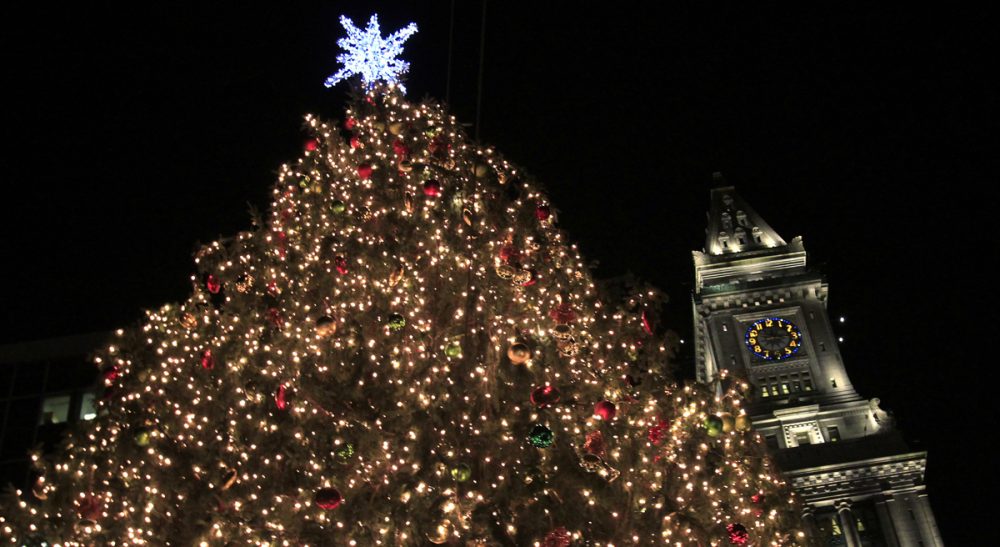Advertisement
Making Peace With Christmas

A note from the editors: Today, Cognoscenti offers two perspectives on the Christmas season from two contributors who don't celebrate — but can't escape — the holiday. Don't miss Barbara Mende's essay, I'm Cool With Yule.
“You have a poinsettia plant?” I asked my aunt, nearly choking on the words. Why would she bring a Christmas symbol into her home in Israel? Had the Christmas season I had hoped to avoid by visiting in mid-December followed me to this Jewish refuge?
“In the U. S., poinsettias are Christmas plants,” I said.
“Here, they’re winter plants,” she said, matter of fact.
Why would [my aunt] bring a Christmas symbol into her home in Israel? Had the Christmas season I had hoped to avoid by visiting in mid-December followed me to this Jewish refuge?
At home in Boston, I feel out of step with the world from Thanksgiving until January, as if I’m leading a parallel life. It’s not just all the wishes for a “Merry Christmas” – from salespeople, handing over my purchases in red and green bags; from a milkman, upon taking a Jewish friend’s order for “Kosher for Passover” milk; from the prospective member of a diversity group I belong to, calling with regrets about missing our December meeting. Should I just say, “Thank you,” I wonder. Or should I give in to the impulse to say, “I don’t celebrate Christmas. I’m Jewish.” Sometimes, I have learned, this embarrasses people who are just being friendly. Other times, it embarrasses me, when I get a look of pity.
My alienation stems from more than the commercialism. It goes beyond the Christmas parties, recently rebranded as the more inclusive “Holiday” parties. It even goes beyond such comments as, “You mean your children never believed in Santa Claus?”
What really makes me feel like I don’t belong are the official ways that Christmas is celebrated in our supposedly secular country. December 25 is a legal holiday. Many public offices feature wreaths and Santa Claus, symbols of the season.
Then there was the conundrum selecting Christmas cards for my Christian friends. None of the commercial ones felt right. Religious Christmas cards would be absurd coming from me. Those that say “Season’s Greetings” seemed false, since I send them to convey Christmas wishes, not greetings of the season.
Finally, my husband and I decided to make our own cards, but we struggled with how best to convey Christmas wishes from Jewish friends. We considered, but then rejected, the idea of a photo of us before a synagogue with the words, “Our best wishes for a Merry Christmas.” Eventually, we crafted a blue card that featured a dove with the Hebrew greeting of peace, “Shalom Aleichem” merging into “Peace Be With You.”
How to spend Christmas day remains a problem I haven’t solved. If I invite Jewish friends to my house, I feel that we’re getting together to avoid being lonely. When I volunteered to deliver meals to elderly shut-ins, I wondered how they would feel about a Jewish guest coming to cheer them up on such a sacred holiday. Another Christmas, I was determined to spend December 25 in Jewish surroundings. My husband and I made the 20-minute drive to a Jewish shopping area in Brookline, Massachusetts. The bookstores and gift shops were jammed. We barely found a parking space.
Afterwards, we treated ourselves to cashew chicken at a Chinese restaurant, one of the few places open on Christmas day. It is something many of us who don’t gather with our family for a Christmas dinner know all too well.
On the other hand, I welcome Christmas or seasonal cards from friends who keep in touch only once a year. I look forward to my Christmas gift from a close Catholic friend, a token of her affection, and enjoy her choral group’s annual Christmas concert. After singing carols during my 10 years as a student in the Boston Public Schools, I even know some in Latin. I love Handel’s Messiah. And, I was proud that my 4-year-old daughter was the only one in her nursery school class who knew that Christmas didn’t commemorate Santa Claus, but Jesus’s birthday.
On the other hand, I welcome Christmas or seasonal cards from friends... I look forward to my Christmas gift from a close Catholic friend, a token of her affection, and enjoy her choral group’s annual Christmas concert.
In Israel, when shopkeepers wished me a “Happy Holiday” in Hebrew, I knew they meant Hanukkah, my holiday. I didn’t feel out of step there, despite the daily challenges of struggling to decipher destination signs on busses, not understanding answering machine messages, and carefully re-reading Hebrew signs on bathrooms so I didn’t go into the wrong one.
Caught up in this Jewish world that used a lunar calendar with different months, I even forgot about Christmas until one evening in Jerusalem. I was stunned to hear bells chiming Christmas carols. What were they doing here? Pursuing me like the poinsettia plant? And then I realized. The bells were coming from a church in the Christian Quarter of the Old City: It was Christmas week. To my surprise, the music seemed like a welcome message from home.
